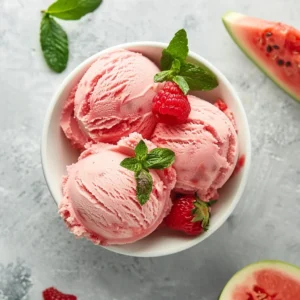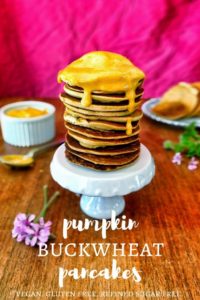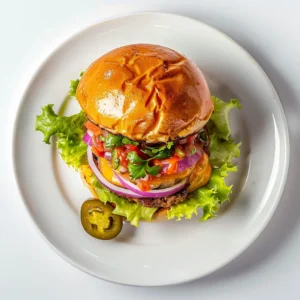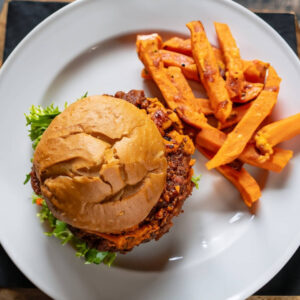Yes – mustard is vegan.
If you’re new to the vegan community and are curious to know about whether mustard is vegan or not, you’ve found yourself in the right place at the right time.
Without further ado, lets ketch-you-up on the mustard facts.
What is Mustard?
Most kitchens in the United States have this well-loved condiment in their refrigerator to drizzle on to certain foods.
Some vegans like to eat mustard on sandwiches, on veggie burgers, in vegan potato salad or to use it as an old fashioned french fry dip.
The texture of mustard ranges from smooth to gritty to whole grain – so if you’re a texture person, this is something to consider when choosing a mustard you’ll enjoy.
The seeds, leaves, and flowers of the mustard plant are all edible, and come in black, brown, and yellow types.
Mustard seeds are full of omega-3 fatty acids, fiber, and in selenium, which helps form strong bones.
Brassica nigra is the name of the plant that produces black mustard seeds, which are often used as a spice in Indian and Pakistani cuisine.
The mustard plants spicy and tiny seeds are removed from their seed coats, where they can be used whole or pulverized into a powder to season a dish.
Brown mustard seeds come from the Brassica juncea plant, which is referred to as Indian or Chinese mustard. These are less spicy than the black mustard seeds, and range in color from dark brown to yellow. These type of seeds are commonly used to make mustard.
Yellow mustard seeds come from the white mustard plant Sinapis alba, and are also used to make mustard.
The seeds are beige and slightly larger than brown mustard seeds, with a milder taste. They do still have a subtle kick to them, short-lived may it be.
Most mustard you see at the supermarket is made from either brown or white mustard seeds, or from a blend of the two.
Mustard Ingredients
Mustard Seeds
Water
Vinegar
Sugar
Spices
Mustard is a food item that’s easily able to be classified as vegan for it’s purity and simplicity in ingredients.
Potential Non-Vegan Mustard Ingredients
Sugar
White sugar that’s not organic is more often than not processed with bone char (ground-up animal bones), which some vegans may not agree with. This is done for a whiter shade of sugar. Even though these animal byproducts do not end up in the final product, the fact that it’s been in contact with bone char is enough for certain vegans to opt out of consuming this ingredient.
Refined cane sugar is often sugar that’s derived from sugarcane or from beet sugar that comes from beets. This is not always a vegan friendly ingredient, but if the sugar is organic – it’s a different story.
Cane sugar may be considered non-vegan by some stricter vegans, just for the fact that they’ve technically been contaminated with bone char particles.
Honey
Since honey is an animal by-product, many vegans prefer to avoid this ingredient. But, this isn’t the case for all vegan diets.
Honey is the main energy source for bees.
A single bee will produce about 1/12 of a teaspoon of honey during its entire lifetime, so it’s important that the whole hive of bees work together to allot the honey, so each bee will have enough to survive off of.
When farmers take out honey from a hive, they replace it with a sugar substitute that lacks the same micronutrients as honey, so the overall health of the bees declines. Something to consider since every dollar spent on an item technically sustains the production of it.
So, one could say honey is really meant for the bees themselves to consume in order to sustain their livelihood.
Wine
Wine is sometimes added in place of vinegar in certain mustard recipes to add a tangy flavor complex to it.
The grape juice and yeast go through a filtering or ‘fining’ process, where there is a risk for contamination with animal based ingredients. If the wine is vegan friendly wine, however, you can be assured the mustard is too.
*Wine may not always be necessarily filtered with animal ingredients, but it’s good to be aware of the possibility.
Verjuice: This is a French term for unripened grape juice, and is an ingredient sometimes found in mustard. Its sour taste is resemblant of vinegar.
Types of Mustard
Mustard is a popular condiment that comes in a variety of different types and flavors, with different mustard seed varietals used as the base ingredients along with certain spices.
Yellow Mustard: This mustard has turmeric in it which it gives it a bright yellow color, and is made from white mustard seeds that aren’t spicy. Out of the mass produced mustards, this is the one that most people are familiar with.
Dijon Mustard: This type of mustard is made with brown and sometimes black mustard seeds.
Originating in the town of Dijon, France, the capital of the Burgundy region of France, in the 13th century, dijon mustard has been around for a while. Dijon was originally made from verjuice from unripe grapes, however, it’s more often than not made with white wine.
Since the white wine is less acidic than vinegar, the spice of the mustard is pronounced.
Deli or Brown Mustard: This mustard is more brownish than yellow in color and is also a spicier flavor. It’s made with whole mustard seeds most times which gives the mustard a bit of the crunch factor. It’s also not as tart as yellow mustard.
Some brands have extra spices like nutmeg in the recipe to round out the flavors.
English Mustard: The characteristic ingredients in this type of mustard vegan are the pulverized yellow mustard seeds and turmeric. It’s typically a pretty spicy mustard.
Maille Dijon Originale Mustard

The ingredients in this dijon mustard vegan are water, mustard, vinegar, salt, citric acid, and sodium metabisulfite (a salt compound).
This dijon mustard vegan contains plant-based ingredients. It has a creamy texture and a taekwondo kick to it.
Coleman’s English Mustard

This mustard is all vegan, and is made with a blend of white, black, and brown mustard seeds.
With the white seeds being mild and sweet, and the brown and black ones airing on the hotter side of the temperature spectrum, this is a nice happy medium of flavor tango.
The ingredients in this mustard are water, mustard flour, sugar, salt, wheat flour, turmeric, and citric acid.
There are no animal ingredients in the Coleman’s mustard brand.
Annie’s Organic Horseradish Mustard

The ingredients in this organic mustard are apple cider vinegar, mustard seed, sea salt, horseradish root, garlic, clove, and natural horseradish flavor.
This choice is made with all vegan ingredient and organic spices.
Annies vegan mustard will deliver you a pungent kick in the sinus with its horseradish and clove notes.
Sir Kensington’s Honey Mustard

This vegan mustard option is made with water, distilled vinegar, fair trade organic honey, mustard seed, organic cane sugar, salt, turmeric, allspice, cinnamon, cloves, and coriander.
Since this brand of mustard has honey in the ingredients list, we are unable to classify it as vegan; however, there are also those vegans that don’t mind eating honey.
If you prefer mustard on the sweeter side and have never tried the flavor combo of honey and mustard, consider trying this with some sweet potato wedges.
French’s Classic Yellow Mustard

French’s brand is known for its yellow mustard, and also for its mass production of mustard that features plant based ingredients.
The ingredients in this vegan yellow mustard are distilled vinegar, water, #1 grade mustard seed, paprika, spice, garlic powder, natural flavors, salt, and turmeric.
This particular, classic flavor of yellow mustard has a mild mustard seed flavor and is smooth, mellow, and tangy on the tongue. Despite paprika being in the ingredient list, it doesn’t add any spiciness to the recipe – but it does make the flavor more full bodied.
As you can see, there are no outright animal ingredients. But, if you’re a stricter vegan – do know that this mustard has natural flavors in the recipe.
Heinz Mustard

Heinz company is most known for making ketchup, but they also make a few mustard flavors – most of which are vegan friendly. It’s just the honey mustard one that some vegans may have an issue with.
This is your average prepared mustard that’s nothing extraordinary. It’s commonplace mustard in the mustard world, but is a very popular condiment brand.
If you are a spice lover, though, Heinz offers a Heinz Spicy yellow mustard with jalapenos, a mustard made with stone ground mustard seeds, paprika, turmeric, smoke flavor, and actual jalapeno.
Ka-Me Chinese Hot Mustard

The special thing about Chinese hot mustard is the spicy reaction that happens between the sulphur compounds in the mustard seeds and the water when they mix together.
The ingredients in Ka-Me are water, mustard, vinegar, salt, spices, turmeric. Pretty simple. And pretty spicy.
In general, Chinese hot mustard can be found in powdered form, or you can opt for the pre-made kind like Ka-Me.
Anyhow, this mustard is 100% vegan status.
This mustard, of course, tastes excellent with Chinese food like fried rice and potstickers. But if you simply prefer soy sauce with Chinese style food- stick with that, then.
Grey Poupon Dijon Mustard

This is a whole grain dijon mustard with vegan ingredients, made from a blend of ground and whole mustard seeds.
This popular brand of vegan mustard has white wine, distilled white vinegar, mustard seed, salt, citric acid, tartaric acid, fruit pectin, sugar, and spices in the recipe.
Grey Poupon dijon mustard is made from a recipe similar to French’s.. though this one is a bit richer of a flavor than the French’s brand, and than other mustards in general.
Note this has white wine in the ingredients list, which some vegans may contend with, as there is a chance for cross contact during the wine production process.
The grape juice and yeast go through a filtering or ‘fining’ process, where there is a risk for contamination with animal based ingredients. If the wine is vegan friendly wine, however, you can be assured the mustard is too.
In order to add a complex ingredient balance, white wine is used in place of straight vinegar which gives the mustard its tangy flavor.
Subway Deli Brown Mustard

This mustard vegan is a spicy brown mustard that you may remember having had eaten on your last Subway sandwich.
The ingredients are distilled vinegar, mustard seeds, water, salt, spices, turmeric, and natural flavor.
This is one of the brands of vegan condiments that some vegans may debate against for the natural flavor ingredient.
How to Make your Own Vegan Honey Mustard
Did you know you can make honey out of apple juice and sugar?
Check out this video for the how-to on how to make vegan honey mustard from the comfort of your own home.
To ensure your homemade honey mustard keeps for as long as possible, it helps to refrigerate it.
Final Thoughts
Mustard is naturally a vegan food condiment.
If you are a vegan that’s passionate about animal rights, you may be a vegan that doesn’t wish to consume honey. If that’s the case and you want to stick with mustard that doesn’t have honey, it’s recommendable to check the ingredients list before you consume it. Mustard generally doesn’t call for honey in the recipe – so, mustard is vegan cuisine most all of the time.
There can just be that one caveat with things, sometimes, ya know.
So go ahead and get lost in the mustard sauce if you want. No one is stopping you.



















